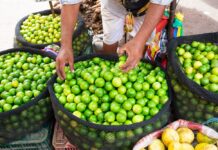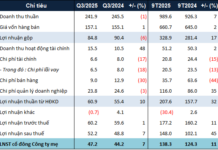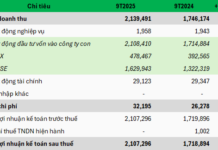Recently, Doan Van Minh Nhut, co-founder of the Ba Mi Ma Hai bakery brand, shared insights into the brand’s journey and the process of building it on the Entrepreneurial Story segment of the Saigon Economic Magazine Online.
Ba Mi Ma Hai, a bakery chain that started as a street-side business in Ho Chi Minh City, has now become a successful chain of fish cake bakeries with a distinctive orange color across various streets.
Explaining the name Ba Mi Ma Hai, Mr. Nhut shared that it is a metaphor. The signature product of Ba Mi Ma Hai is the fish cake baguette. “Ma Hai” here means Mother Ocean – the provider of abundant natural resources and fresh seafood to create premium fish cakes. Thus, Ba Mi Ma Hai wants to express its deep gratitude to Mother Ocean.
Additionally, “Ma Hai,” with the word “ma” meaning mother, reflects the brand creators’ intention to deliver products to consumers with the love and dedication of a mother for her children.
80% OF BA MI MA HAI’S FRANCHISE PARTNERS ARE BLUE-COLLAR WORKERS
Ba Mi Ma Hai currently has about 1,000 franchise partners from the North to the South of Vietnam, with a franchise fee of 7.5 million VND.
Mr. Nhut shared that before the Covid-19 pandemic, in 2018-2019, Ba Mi Ma Hai had built a franchise system with hundreds of partners, with a brand franchise fee of over 22 million VND. However, the pandemic brought countless difficulties for the partners, and the brand also faced significant challenges as sales plummeted, even reaching almost zero at some point. This situation forced Ba Mi Ma Hai to make changes.
After this period, Ba Mi Ma Hai realized the need to be flexible and not insist on a franchise package with a substantial investment cost while people were tightening their expenses. Thus, they proactively cut operating and setup costs to streamline the model, making it more accessible to potential partners at a lower price. Mr. Nhut even mentioned that Ba Mi Ma Hai could bear a partial loss in the setup process. They plan to profit from supplying ingredients after the customers’ businesses stabilize.
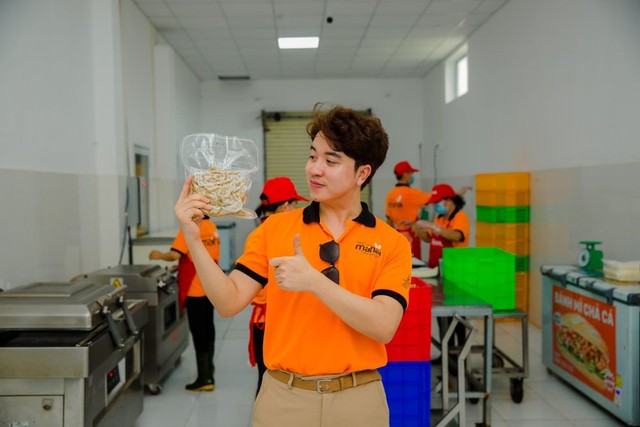
Mr. Doan Van Minh Nhut
Mr. Nhut also shared that 80% of Ba Mi Ma Hai’s current franchise partners are blue-collar workers, including housewives, people who lost their jobs due to Covid-19, and those seeking new opportunities. The remaining 20% are young people interested in learning about business through the franchise model and those who already have existing businesses, such as cafes or convenience stores, and choose to invest in Ba Mi Ma Hai to optimize their income.
“Street food business has no limits for any subject; you just need to have a passion for business. I think the franchise cost of 7.5 million VND for Ba Mi Ma Hai is a reasonable investment,” said Mr. Nhut.
THE SECRET TO FRANCHISE BUSINESS SUCCESS
Mr. Nhut emphasized that in franchise businesses, not only must the investment cost be reasonable, but the business model itself must be effective. A cheap or even free franchise model is useless and cannot help expand the business if it does not generate profits. What matters is that the model enables partners to increase their income and feel satisfied with it. This will drive the expansion of the business model. He also mentioned that some of Ba Mi Ma Hai’s franchise partners had managed to recoup their investment in the very first month.
Ensuring business efficiency for franchise partners is a top priority for Ba Mi Ma Hai. This stems from the fact that the brand does not profit from setting up sales points but mainly from supplying raw materials. Therefore, the success of the franchise partners is of utmost importance to Ba Mi Ma Hai.
To effectively support its partners, Ba Mi Ma Hai provides raw materials at reasonable and stable prices and ensures a steady supply, even during scarce seasons. In fact, from before the Covid-19 pandemic until now, Ba Mi Ma Hai has not increased product prices for franchise partners. Additionally, the brand focuses on protecting and strengthening its identity, expanding brand recognition, and creating a competitive advantage for its business partners.
Regarding the issue of premises, Mr. Nhut shared that in the initial phase, Ba Mi Ma Hai lacked experience in setting up and finding suitable locations. The first few retail outlets were not effective due to their newness in the business and the lack of experience. These outlets were located near red-light districts, and although there was a high volume of traffic, customers did not stop to buy due to being stuck in traffic jams. This situation forced Ba Mi Ma Hai to close the outlets and incur setup investment losses. However, Ba Mi Ma Hai has since developed specific criteria to guide its franchise partners in choosing appropriate locations for more efficient business operations, and this has become an essential aspect of the brand’s support for its customers.
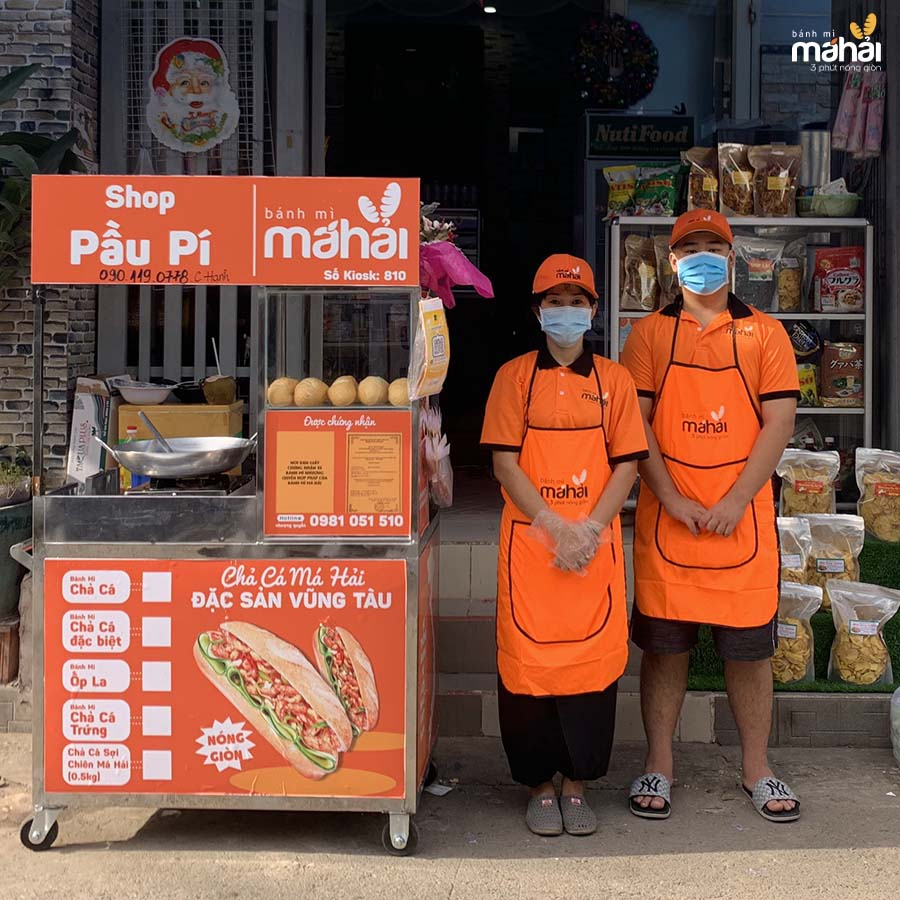
On the topic of quality control, according to Mr. Nhut, this is a common challenge. Ba Mi Ma Hai controls quality from the very beginning, starting with the design of the model and products. The Ba Mi Ma Hai baguette is simple, consisting of a baguette, fish cake, sauce, and vegetables. The difference lies in the recipe for the fish cake and the sauce. The simple product design makes it easier for Ba Mi Ma Hai to control quality and, consequently, easier to replicate the business model.
Subsequently, the brand must establish a specific production process, from production to market release, and provide detailed instructions to its franchise partners on delivering the products to consumers. Quality must be strictly controlled throughout this process.
An essential point to note in the production stage is to keep samples of the products. Mr. Nhut shared a story about how Ba Mi Ma Hai once encountered a situation where a transportation partner experienced a vehicle issue, which affected the temperature and, consequently, the quality of the products. When the products reached the consumers, the Ba Mi Ma Hai franchise partner had to explain the situation, and fortunately, they always keep records of product samples, dispatch dates, and expiration dates. This incident highlighted the importance of process control.
AFTER SHARK TANK
Ba Mi Ma Hai participated in Shark Tank Season 5 and successfully raised 5 billion VND for 36% of the company, with the support of Shark Louis, Shark Lien, and Shark Linh.

Mr. Nhut shared that after participating in the startup competitions Start Wheel and Shark Tank, Ba Mi Ma Hai received attention from foreign partners in countries like Cambodia, Thailand, and Hong Kong. However, they are currently focusing their resources on developing the domestic market and collaborating with agencies to address post-COVID unemployment issues. Nonetheless, Ba Mi Ma Hai maintains relationships with international partners to bring Vietnamese baguettes to the global stage in the near future.
Ba Mi Ma Hai’s direction for the coming period is to continue expanding its franchise system to 64 provinces. Regarding their international development strategy, they prioritize regions with similar tastes to Vietnam, such as Southeast Asia and East Asia, before expanding to more distant markets like Western countries.
With over 1,000 franchise partners currently, Mr. Nhut revealed that Ba Mi Ma Hai aims to increase this number to 10,000 in the future. They will continue to work with organizations and local agencies to develop entrepreneurship and welfare programs. Additionally, they are collaborating with universities to develop a national entrepreneurship program to support student startups. Their long-term goal is to introduce the Vietnamese baguette brand to the world. These are the three development directions that the company is pursuing.
Shark Binh showcasing Phuong Oanh’s cooking skills on TV while expressing his views on raising children: “All assets belong to the father, the child will enter life empty-handed!”
According to Shark Binh, scarcity is the father of creativity. Startups are no different, as the lack of money forces them to think outside the box and innovate in order to succeed.
Improving the Quality of Vietnamese Products through Supply Chain Enhancement
“Vietnamese Goods Conquer Vietnamese People” aligns perfectly with the interests of genuine businesses, those with a long-term vision and responsibility. As a result, the central solution that the Steering Committee of the campaign “Vietnamese Prioritize Using Vietnamese Goods” is highly concerned about is to build a truly sustainable supply chain of Vietnamese goods, in a modern, transparent, safe, and efficient manner…


